Concentrated female power, bodybuilder dragons and a Stargate
What awaits the spectators at this year’s Nibelungen Festival and the play “BRYNHILD
When spring is in full bloom in Worms, it is also an unmistakable sign that the Nibelungen Festival in my hometown is preparing for the big premiere on July 7. As usual under artistic director Nico Hofmann, a world premiere will be brought to the stage on the north side of Worms Cathedral. “BRYNHILD” is the name and was written by the successful author Maria Milisavljević.
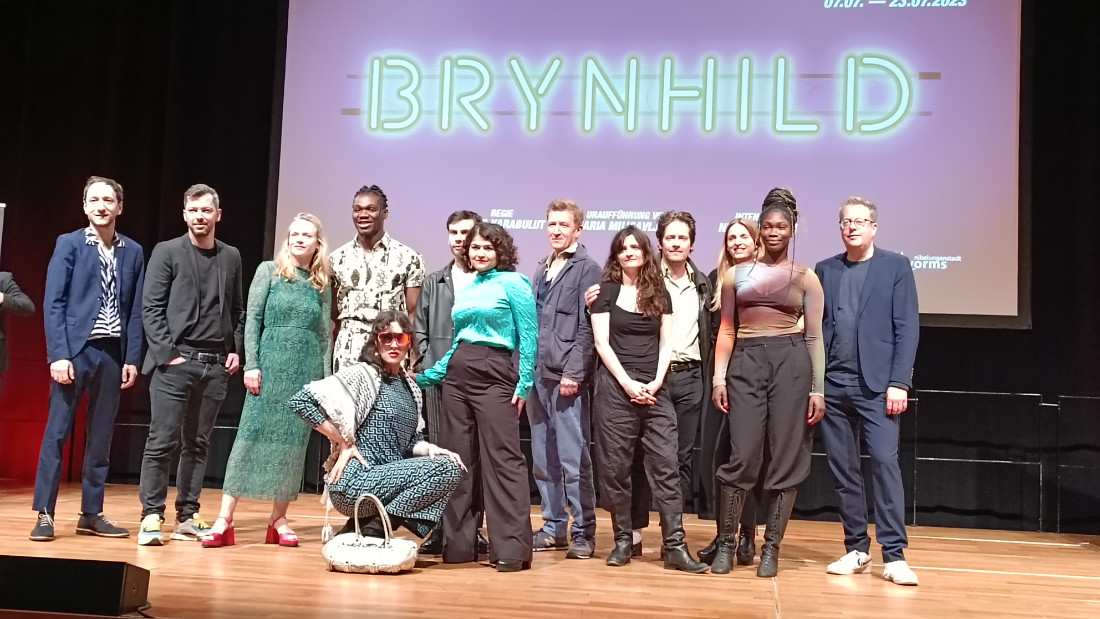 Incidentally, this is the first time in the 20-year history of the festival that a woman has had writing responsibility. This is interesting, because at the center of the Nibelungenlied are two strong characters who are met with violence from the male side. In recent years, the festival has repeatedly dealt with this key theme of the Nibelungen saga, but always from the inevitably male perspective of a male author. This is not wrong per se and has sometimes led to interesting contributions such as “Siegfried’s Heirs” by Feridun Zaimoglu and Gerhard Senkel. At that time, the author duo thought the story further and dealt with the question of what actually became of Brünhild after the Burgundians set out to join Kriemhild and Etzel and perished in a slaughter. The author Milisavljević also places Brühnhild at the center of the story. However, it travels all the way back to the beginning and makes use of Norse mythology, more specifically the songs Edda. There Brünhild is called Brynhild, lives as daughter of Odin and Frigga on Isenland.
Incidentally, this is the first time in the 20-year history of the festival that a woman has had writing responsibility. This is interesting, because at the center of the Nibelungenlied are two strong characters who are met with violence from the male side. In recent years, the festival has repeatedly dealt with this key theme of the Nibelungen saga, but always from the inevitably male perspective of a male author. This is not wrong per se and has sometimes led to interesting contributions such as “Siegfried’s Heirs” by Feridun Zaimoglu and Gerhard Senkel. At that time, the author duo thought the story further and dealt with the question of what actually became of Brünhild after the Burgundians set out to join Kriemhild and Etzel and perished in a slaughter. The author Milisavljević also places Brühnhild at the center of the story. However, it travels all the way back to the beginning and makes use of Norse mythology, more specifically the songs Edda. There Brünhild is called Brynhild, lives as daughter of Odin and Frigga on Isenland.
Liederedda instead of Nibelungenlied
At a press briefing I held as part of my work for the WO! magazine, the author explained that in the Song of the Edda the story between Brynhild and Sigurd was a blank that she now wanted to fill. Sigurd, that’s Siegfried, and he’s a sword-wielding hothead, as in the Germanic version, who claims to have slain a dragon. But anyone expecting a mythologically charged love story between two powerful characters has of course missed out on the festival. Unlike such family-friendly festivals as those featuring Winnetou or Klaus Störtebeker, the Nibelungen in Worms feels more like the classic “Everyman,” doomed to repeatedly negotiate its own tragic fate. In Worms this summer, this means that director Pinar Karabulut not only wants to stage visually stunning open-air theater, but also asks questions. So she explained recently at the start of rehearsals on May 19: “What I find so exciting is how do I retell a story that is so entrenched in cultural memory?” Or is it so fixed that it keeps coming back like a nightmare?” Thus, Brynhild, the Icelandic daughter of the gods, finds herself caught in the dichotomy between tradition and self-empowerment. Karabulut on this: “As a woman, as a body read as female, can she break out of her role? Can she do it alone? Who is stronger: you or history?”
At the Festival’s press conference, I also had the opportunity to ask the lively, likeable director, who is currently one of the most sought-after theater makers in the German-speaking world, about her plans for the production:
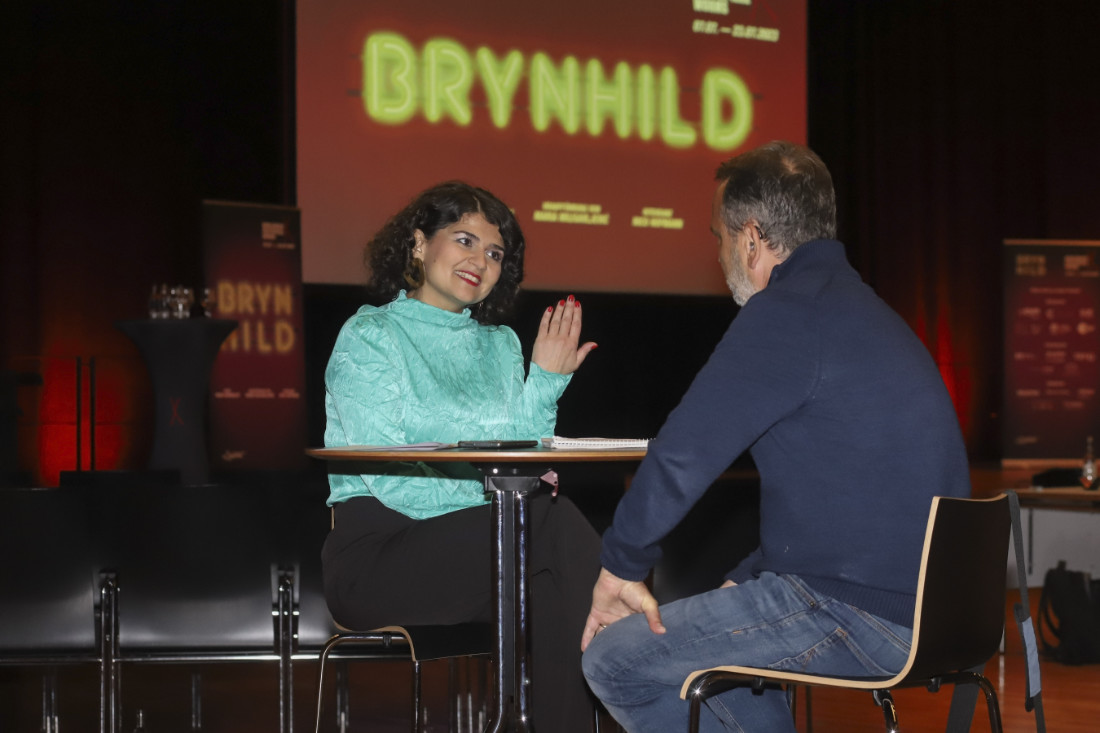
Photo: @ Andreas Stumpf
WHERE! They stage in front of the Worms Cathedral. What does it mean to set such a stage?
I have actually only done one open air production so far. That was an opera. But that wasn’t nearly as big as it will be here in Worms. Nevertheless, my set designer Michela Flück and I were never afraid of the size of the stage. My first thought was, how can we make it to be able to insert things from the top of the image? Can we rent a crane? Then, however, we were told directly that we couldn’t do that. The question we ended up asking ourselves was, how can we find new ways to make this evening work.
WHERE! That is, in the theater you have the advantage of the equipment and here the challenge of nature?
Right. That’s the aspect I’m most looking forward to. I can only rely on the usual theater technique to a limited extent, since nature dictates the weather. So we have to direct the complete psychology of this evening differently That’s the challenge I’m looking forward to. The sheer size of the stage is just inviting me to do more on stage at the same time (laughs).
WHERE! In an interview, you spoke of wanting to subvert viewing habits in terms of staging. What does that mean exactly?
That’s actually one of my main driving points in my job. For me, art should be something insanely liberating, something that inspires people. For example, when I go to a museum and look at a painting, I want it to do something to me, and when I take it home in my mind, it transports me to another world before I sit down at my desk again. Again, I think it’s a pity that in German-speaking theater there are always narrative rules that must be followed at all costs. Accordingly, it is often the case that the audience already enters the theater with the expectation that the story will be told exactly as it is. But life is not like that. Life is much crazier. In part, we are much more well-behaved on the theater stages than actual life plays.
WHERE! Isn’t there also a danger that the audience will be overwhelmed by too much newness?
Yes, I am aware of that, and I know that there is a danger that viewers will close their minds.
You can read the full interview here: www.wo-magazin.de
What is new at this year’s festival is not only the creative female dual leadership of author and director, but also a thoroughly diverse approach that does not stop at a change of roles between the sexes. Thus, the Darth Vader of the Germanic vocal sagas, Hagen von Tronje, is transformed from a one-eyed grumpy family protector into a dark-skinned protagonist played by actress Ruby Commey. Sigurd is played by Bekim Latifi and Frigga, Odin’s wife, by the versatile artist Parisa Madani. The Togo-born actor Bless Amada once again takes on the role of Odin, the father of the Norse gods. So far, so colorful! While in the cinema the emancipation of diversity is currently not proceeding without criticism and box office losses, in the theater the reinterpretation of gender roles has long been a normality, even if in the case of “BRYNHILD” I must attest that it is certainly not an uninteresting experiment for the primarily rather conservative festival.
Who are the actors and actresses?
Parisa Madani comes from German-Persian parents and works today as a singer, actress and offers experimental dream meditations. Bless Amada, in turn, was born in Togo. When he was ten years old, his parents moved to Munich. There he completed his acting training at the renowned Otto Falckenberg School. In the last two years he starred in numerous TV series. The German-Albanian actor Bekim Latifi also studied in Munich. Latifi worked for many years at the Thalia Theater and currently plays for the Münchner Kammerspiele. Şafak Şengül from Mainz is at home on many stages and in 2020 also starred in the highly acclaimed feature film “Rabiye Kurnaz vs. George W. Bush” by Andreas Dresen. Denmark’s Jens Albinus has a firm place in Scandinavian television crime. In recent years, he has appeared in series such as “Commissioner Lund”, “The Eagle” and “Borgen”. Also part of the cast is Laina Schwarz, who is also a welcome guest in TV crime dramas and most recently starred in the series “Marie Brand”, SOKO Wismar” and “Der Staatsanwalt”. As varied as the names of the series are their engagements on Germany’s theater stages. Simon Kirsch is a much sought-after theater actor who has shone in recent years on stages such as the Burgbühne in Vienna, the Schauspielhaus in Zurich and the Thalia Theater in Hamburg. Ruby Commey earned her good name mainly on Berlin stages. The dark-skinned actress became internationally known for the music video Deutschland, released by the band Rammstein in March 2019, in which she plays Germania. Lena Urzendowsky again appears in the title role of Brynhild. Urzendowsky makes her theater debut in Worms. The 23-year-old has already made a name for herself in front of the camera, starring in the much-discussed Amazon Prime series “Zoo,” based on the autobiography “Christiane F. Wir Kinder vom Bahnhof Zoo.” Also based in the 70s and also produced for Amazon, the Berliner also played an important role in the series “Lude”.
A special guest as a dragon
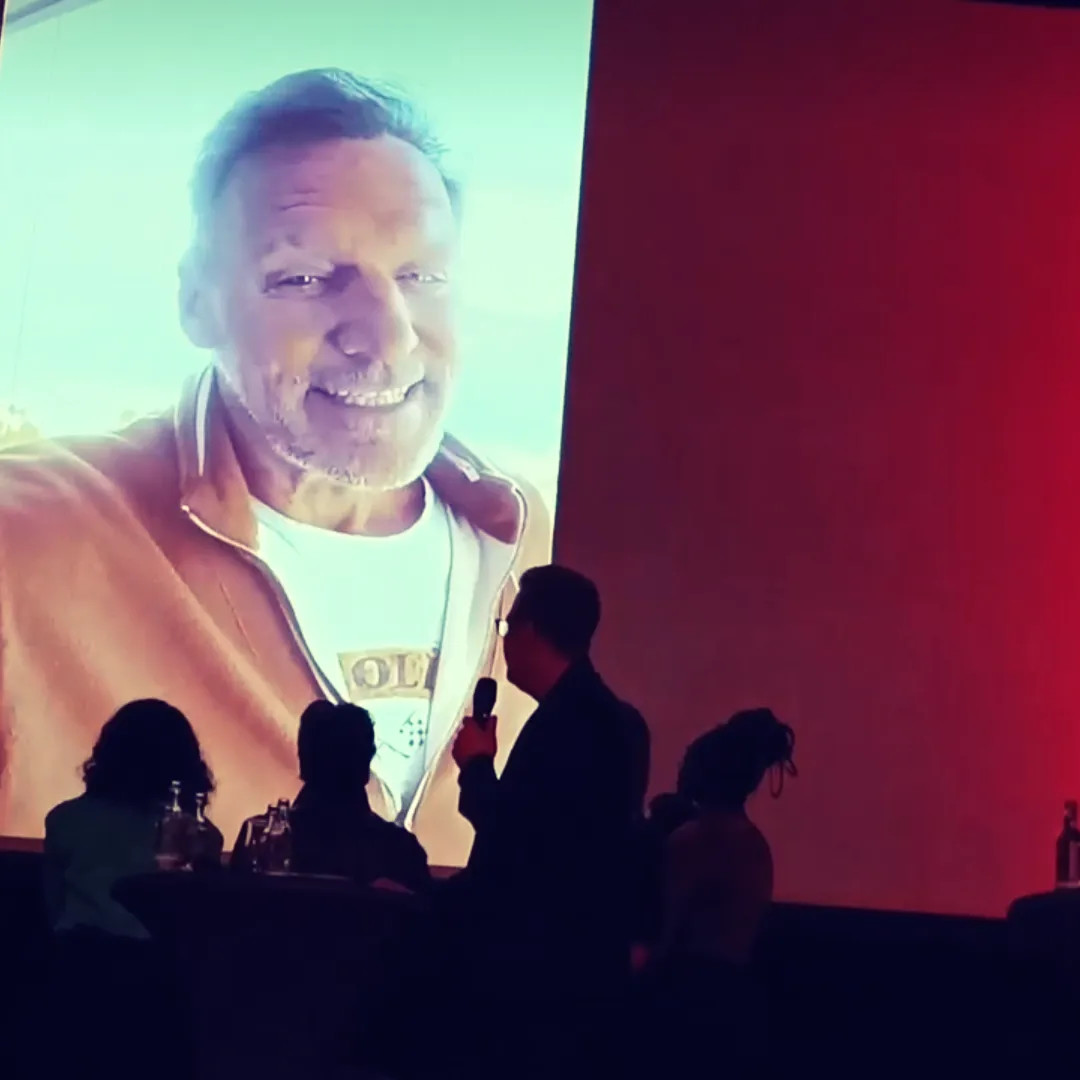
Actually, according to Intendant Hofmann, the ensemble should be the star, or as he explained it at the press conference, “We want to get away from the star-driven ensemble!” But you can’t quite keep your hands off prominent names in 2023 either. This year’s cast includes special guest bodybuilder Ralf Moeller (“Gladiator,” “Conan” series). A name that is out of the ordinary at first glance, but ultimately interesting. Moeller will not be live on stage, but he will contribute his experience in front of the camera, because Moeller’s scenes will be filmed in the Odenwald and later integrated into the play via a giant LED screen at the festival. The man with the impressive body proportions and permanent buddy of Arnold Schwarzenegger plays the dragon Fafnir (!) in the play “BRYNHILD”. What exactly this will look like, whether Moeller will crawl through the Odenwald made up as a dragon, only lend his voice or not be a dragon in the true sense of the word, this secret will of course only be revealed at the premiere.
Where there is a festival, there must also be a bit of spectacle
Although all those responsible always emphasize the artistic claim, this too must submit to the dictates of the summer spectacle, because the festival not only wants to invite intellectual debate, but also to a certain extent to overwhelm the audience. Basically, it needs only the view of the overpowering cathedral to overwhelm, but that alone is not enough to captivate over the three hours of the performance. Together, they reach deep into their bag of tricks to create a “neo-futuristic” world, as the director describes it. At a press briefing in the fall of 2022, director Karabulut talked about making the set purple. In fact, initial visualizations show a purple desert in front of a giant video screen that also acts like a portal. The characters on stage can pass through this Stargate er portal times, from ancient times to the future. Video artist and filmmaker Susanne Steinmassel will put this portal in perspective, but will also actively support Karabulut in shooting the cinematic scenes. The stage designer Michela Flück promises a novel world in front of the cathedral. One that unites the eras. “The cathedral seems like a hallucination in the dystopian world in which we set Brynhild’s life,” the Zurich-born set designer says of her work. “A timeless landscape surrounds Worms Cathedral: fragments of an ancient excavation site buried under sand, not a sea in sight,” she continues. A spectacle for the ears is promised by musician Daniel Murena, who together with Martin Tagar and Oliver Bersin will be responsible for the stage music, which will be played live for the performance. Murena is an exciting composer whose roots are in pop and rock, but also feels at home in the avant-garde. Together with classical composition approaches, filled with horror sound and industrial effects, the musician has already given several theater pieces the right sound since 2006 and should also conjure up an unusual musical garb in the night sky of Worms in the context of the festival.
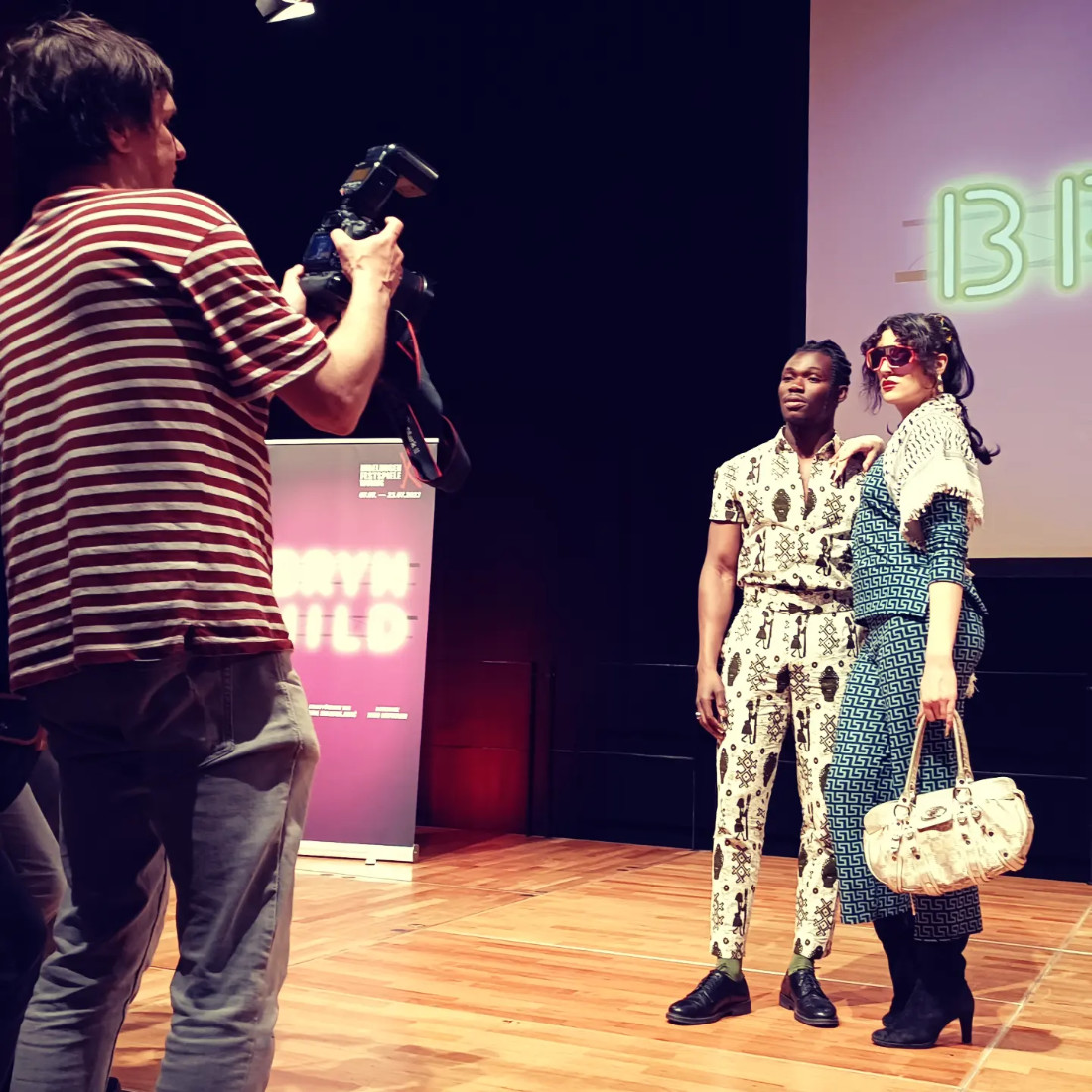
After 20 years of the Nibelungen Festival, it is actually amazing how many facets can still be drawn from this 800-year-old story. This year, in addition to the female perspectives, it is also important to gather a young team in front of the Cathedral, combined with the hope of bringing the historical heritage of this great material to younger people. This can only be a good thing, because after all, the Nibelungen is also an object lesson in how greed, hatred, envy and, above all, power can lead everyone to their doom. I, for one, am looking forward to the piece “BRYNHILD.” The only thing missing is the right weather, but that’s usually free in Worms.
The festival will be held in the period from July 7 to July 23.
You can find more information about the festival here: https://www.nibelungenfestspiele.de/nibelungenfestspiele/
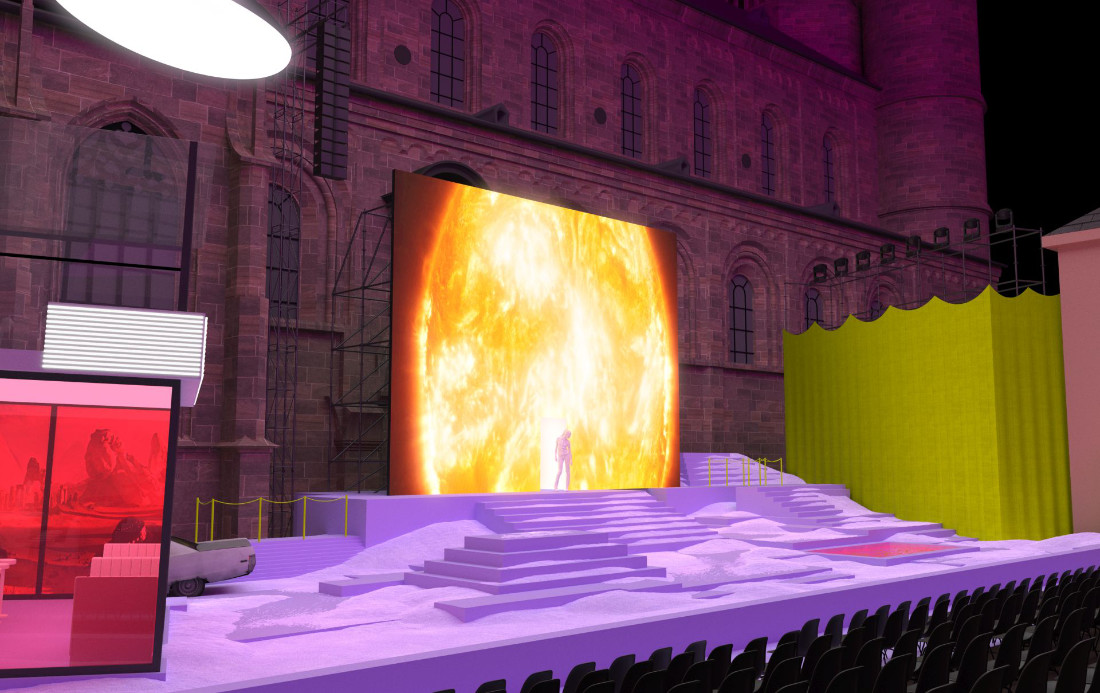
Stage design “BRYNHILD”, photo: @ Nibelungen Festival



